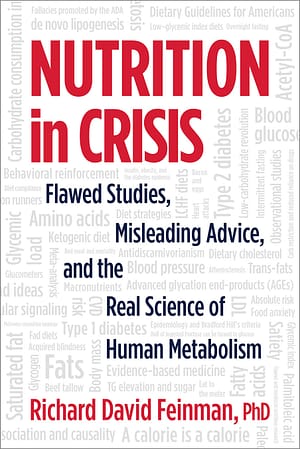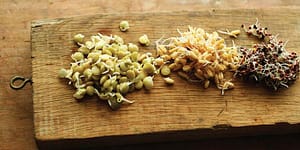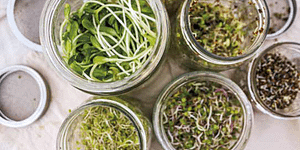Sugar, Fructose, and Fructophobia

We’ve always known that if you sit around all day eating candy, you will get fat. Conversely, cutting down on sugar, which is a carbohydrate, will contribute to weight loss and other benefits of a low-carbohydrate diet. However, the extent to which sugar, that is, sucrose, or its component fructose, contributes to obesity and other effects of carbohydrates is not well understood. Even though there are myriad studies that claim otherwise.
The following excerpt is from Nutrition in Crisis by Richard Feinman. It has been adapted for the web.
Whatever your degree of interest in nutrition, you are likely familiar with the media’s crusade against sugar. There are now numerous scientific articles, picked up by the popular media, with titles like “Consuming Fructose-Sweetened, Not Glucose-Sweetened, Beverages Increases Visceral Adiposity and Lipids and Decreases Insulin Sensitivity in Overweight/Obese Humans.”1 The sudden and pervasive spread of high-fructose corn syrup (HFCS) has made fructose a particular object of fear and loathing, despite the fact that HFCS has about the same proportions of fructose and glucose (55:45) as table sugar (50:50). The strange bedfellows in this political movement include Michael Bloomberg, the former mayor of New York, and Robert Lustig, a pediatric endocrinologist. Exaggeration and alternative facts are the standard: Bloomberg claimed that banning large bottles of soda would solve the problem of obesity, and Lustig told us that sugar was as bad as alcohol or cocaine. How do we make sense of all this?

The problem is that we don’t really have an answer when it comes to fructose. For people with diabetes or metabolic syndrome, or even those who are overweight, the data are clear: Total carbohydrate restriction—any carbohydrate—is the most effective therapy. Yet we don’t know the extent to which removing fructose is a player in these therapeutic effects—because of the insulin effect, if you have diabetes, it is almost always better to remove starch than to remove sugar. The sugars are interconvertible and effects differ depending on conditions. You don’t need credentials to do science, but what professionals do know is that you can’t simply make guesses. Because of the complexities—depending on conditions more than half of ingested fructose is turned to glucose—you can’t extrapolate from isolated experiments. Sometimes, you need the data. Biochemists are rare in nutrition because we simply don’t know enough. I continue to admit that I am just about the only biochemist dumb enough to get involved here.
In Defense of Sugar (and Fructose)
Writing a “defense” of sugar seems very odd. In some ways, it’s in the same vein as the defenses of saturated fat that I have written in the past. In those cases, I stressed the need for perspective. People have been making and eating cheese for as long as they knew how. What am I defending? Eggs Benedict? Béarnaise sauce? Soppressata sausage? These have been part of our culture for generations. Were we really supposed to believe that some recent earth-shattering scientific discovery meant we’d been consuming poison all along? It didn’t seem to make sense, and in fact, the science was very poor, sometimes embarrassingly poor. It’s the same case with fructose. Sugar is a food, and while nobody denies that many in the population are plagued by overconsumption due to excessive availability, it is still a feature of la cuisine, haute and otherwise. Chocolate mousse is as much a part of our culture as Wagner. Some of us have to limit mousse to very small doses, but for many, that is also true of Wagner.
The Threat of Fructophobia
Rob Lustig is a nice guy. Everybody says this before criticizing his increasingly unrestrained crusade against sugar. He is almost as ubiquitous as HFCS itself. His YouTube and 60 Minutes performances, among others, have raised him to the standard of scientific spokesperson against fructose. One of Lustig’s YouTube videos begins with the question, “What do the Atkins diet and Japanese food have in common?” The answer is supposed to be the absence of sugar but, of course, that isn’t true.
Sugar is an easy target. These days, if you say “sugar,” people think of oft-vilified foods such as Pop-Tarts or Twinkies, rather than red wine, poached pears, or tamagoyaki, the sweet omelet that is a staple in Bento Boxes. Here’s a question, though: If you look on the ingredients list for Pop-Tarts, what is the first ingredient, the one in largest amount? It’s not sugar; it’s enriched flour. When I posted this on my blog, one person claimed that although flour is the first ingredient, if you add up the high-fructose corn syrup, dextrose, and other types of sugar, their sum is larger. Some have indeed suggested that this is a strategy to hide total sugar content. It’s an interesting idea, but easily disproven: the label clearly says that there are 38 grams of total carbohydrate and only 17 grams of sugar.

The barrier to introducing some common sense into the discussion is, again, that we really don’t have the answers. We don’t have enough data. The idea that fructose is a unique agent in increasing triglycerides (fat in the blood) is greatly exaggerated. High-carbohydrate diets lead to high triglycerides, and there are indeed conditions where sugar has a worse effect than starch, but the differences between the effects of fructose specifically and those of carbohydrates in general are small. The greatest threat of fructophobia is that we won’t find out what the real effect of fructose is. Furthermore, the two regimes being compared in current studies are both high in carbohydrate, and because the absolute level of the triglycerides is high in both cases, it is likely that the biggest difference would be seen if either of the outcomes were compared to the results of a low-carbohydrate diet.
The single most important question to ask with regard to sugar is this: For a person on the so-called standard, high-carbohydrate American diet, is it better to replace carbohydrate (any carbohydrate) with fat (any fat except trans-fat), or to replace fructose with glucose? Ignoring subtleties, to a first approximation, which is better?
We might not know the answer to that question in every case, but the studies that have been done clearly indicate that replacing carbohydrate with fat is more beneficial. We also know that ethanol is not processed like fructose despite what many claim on the internet. Although the pathways converge, like almost all substrates that are used for energy at the entry to the TCA cycle, they are different. It’s just not true that there is a similarity. We also know that although some claim glycogen is not formed from fructose, and Lustig shows a metabolic pathway from which glycogen is absent, fructose does actually give rise to glycogen. Under most conditions, fructose is a preferred substrate for glycogen synthesis. (In fact, for some period in the history of chemistry, fructose was primarily considered a “glycogenic substrate.”) Of course, fructose must first be converted to glucose. Claude Bernard knew that fructose could give rise to glycogen, but he couldn’t understand why he wasn’t able to nd any fructose within the glycogen itself.
To return to the comparison that is often made between sugar and ethanol, it is possible that sugar and ethanol have behavioral effects in common, but this is not due to similarities in metabolism. Moreover, the behavioral effects are not even settled within the psychology community:
Alcoholism is far different from sugar addiction, if there is such a thing. While there is no definite agreement, addictive has formal definitions in behavioral psychology, and polishing off the whole bag of chocolate chip cookies might not technically qualify as addictive behavior. Some restraint is necessary. Alcohol-associated liver disease is a well-characterized, life-threatening condition, and many people do die from it. The idea that fructose can have the same effect, either physically or psychologically, has no basis in science and is deeply offensive to people who have had personal experience with alcohol-related illness and death.
In the end, nobody has ever been admitted to a hospital for an overdose of fructose. People might say that your diabetes was caused by fructose consumption, but you can’t be admitted to a hospital on somebody’s opinion of what you did wrong. There is no diagnosis called “fructose poisoning.” If you are admitted to the hospital for type 2 diabetes, that is the diagnosis.
The Threat of Policy
The numerous scientific papers that find something wrong with fructose may have had little impact on people’s behavior, but possibly for that reason, the fructophobes have taken new steps. Convinced of the correctness of their position, they have taken their case to politicians who are always eager to tax and regulate. There is an obvious sense of déjà vu as another group of experts tries to use the American population as guinea pigs for a massive population experiment, along the lines of the low-fat fiasco under which we still suffer (not to mention the historical example of alcohol prohibition). It is not just that the lipophobe movement had unintended consequences (think margarine and trans-fats) but rather that, as numerous people have pointed out, the science was never there for low-fat to begin with. In other words, before science is turned into policy, we have to address the question of whether the science is any good to begin with.
Recommended Reads
The Science Behind Food Preferences: More Than a Matter of Taste
Recent Articles
Want to start your own medicinal herb garden? Passionflower, lemon balm, and goldenseal are great places to begin! These herbs are jam-packed with medicinal properties and easy to grow in a majority of climates.
Read MoreSprouts are easy to cultivate, mature quickly and pack a nutritional punch! You can make nutrient-rich sprouts from all kinds of edible seeds in your kitchen.
Read MoreWhy is modern wheat making us sick? That’s the question posed by author Eli Rogosa in Restoring Heritage Grains. Wheat is the most widely grown crop on our planet, yet industrial breeders have transformed this ancient staff of life into a commodity of yield and profit—witness the increase in gluten intolerance and ‘wheat belly’. Modern…
Read MoreSuffering from frequent headaches is miserable and immobilizing. If you haven’t had luck treating and preventing your headaches, skip the over-the-counter approach and prepare herbal formuals for migraines to use in the future! The following is an excerpt from Herbal Formularies for Health Professionals, Volume 4 by Jill Stansbury. It has been adapted for the…
Read More








